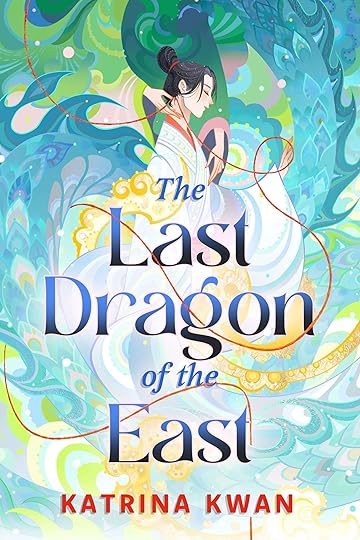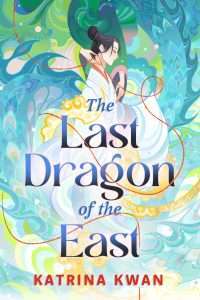An Interview with Katrina Kwan
Katrina Kwan is no stranger to the literary world, though her name is a new one. She was an accomplished ghostwriter, focusing on romance, before trying her hand at writing for herself. The Last Dragon of the East is a compelling adult fantasy debut, set in a Chinese-inspired world. It features surprisingly little romance, instead drawing the reader into a vivid story of dragons, greed and destiny. It’s been great catching up with Katrina ahead of The Last Dragon of the East‘s release later this year.
[GdM] To get us started, can you pitch The Last Dragon of the East in a sentence or two?
[KK] The Last Dragon of the East is about a young man with the ability to see red threads of fate between soulmates who finds himself embroiled in a devious plot to hunt down the last dragon in existence—all while discovering the truth of his own Fated One along the way.
[GdM] While this is your debut, you’re coming at this as an experienced (ghost)writer. In what ways was your experience writing and publishing for yourself new and different?
[KK] It’s honestly so surreal! I was a professional ghostwriter for roughly six years before I wrote The Last Dragon of the East, and in that time, I’d written a little over 150 projects for a handful of clients—and the wild thing is that no one will ever know I wrote them!
Obviously, getting to see my name on the front cover is the biggest difference, but there’s also something to be said about deadlines and pacing. As a ghostwriter, I had tight turnarounds (often one book a month/month and a half), but now I can really take my time and care sinking my teeth into the worlds I’m creating.
My work as a ghostwriter was certainly a fabulous opportunity to develop my craft. When it came to writing stories under my own name, I was eager and ready to get everything down on the page.
[GdM] It would be great to learn more about your writing process. How do you approach a new story?
[KK] All my story ideas come to me in the shower. (Sorry if that’s TMI.) I tend to space out while washing my hair, and that’s when ideas will pop into my head. It usually isn’t a fully formed thought, just an abstract concept, but then my imagination takes over and handles the rest.
For The Last Dragon of the East, for example, I’d been daydreaming about another book I’d been reading, Madeline Miller’s The Song of Achilles. It had me thinking about how I was very familiar with Greek mythology (and by extension Roman and Norse mythos) having grown up in the West, but I knew very little about the myths of my own culture.
That was when I had the shower thought—Could I write a story based on a Chinese myth? What stories did my parents and grandparents grow up with? Would this be an opportunity to reconnect with my roots? I went into a research deep-dive later that evening, and the idea behind The Last Dragon of the East started to take shape.
[GdM] In the story, you use dialect sparingly for certain characters. How did that come about?
[KK] I think inserting dialect into a character’s dialogue is a great way to pay homage to the Chinese influences that inspired this story, as well as lend to the worldbuilding. The reason I use dialect sparingly is because, although I want to give the characters a unique voice, I’m also mindful of the reader experience. At the end of the day, I want to make sure that my stories are accessible for all to enjoy—little to no prior knowledge of another language required. It’s all about striking a balance!
[GdM] While Feng is gruff and Jyn wise and calm, Sai is at his core soft and domestic – and has no sense of self-preservation. What attracted you to these archetypes and to what extent do you play off your readers’ expectations?
[KK] I think this might have been a response to the ghostwriting projects I was involved with. My clients were very particular about wanting “bad boy alpha male” leads (and honestly, there’s nothing wrong with that), but after writing what was effectively the same character over and over again, I desperately wanted a change.
I love leads who are goofy, have hearts of gold, and ultimately just want to do their best—which is probably how Sai came to be. I’m a firm believer that just because a character is soft, that doesn’t necessarily equate to ‘weak,’ and Sai proves this time and time again through his resilience and determination (even if it often lands him in hot water and he is physically quite weak).
As for readers’ expectations—I’m not too sure. I hope they enjoy the change. As an avid reader myself, I’ve seen a pattern in fantasy as of late where characters are written as strong, brave, and broody. Don’t get me wrong, I enjoy these archetypes very much, but hopefully The Last Dragon of the East can be a nice palette cleanser.
[GdM] I particularly loved your approach to love and fate, showing how easily they can be twisted into greed and pain. Could you talk a bit more about your intentions there?
[KK] (Spoilers ahead.) In The Last Dragon of the East, there are actually two storylines playing out in parallel with one another. There’s the love story between Sai and Jyn, as well as A-Qian and Emperor Róng. Both tales eventually knit themselves together.
At the time, I wanted to explore the definition of love and how it can manifest. Ultimately, I think true love is selflessness. It endures, regardless of hardship and tragedy. Through Sai and Jyn, I wanted to explore a connection that was more than just physical. These two share a bond that transcends time and space. They are two halves of the same soul, destined to find one another in every lifetime.
Through A-Qian and Róng, I wanted to explore what happens when love becomes warped. When love becomes possessive, controlling, toxic—it can no longer be called love. Juxtaposing the two couples felt poignant, but reflective of the types of relationships we see in the world.
[GdM] To me, The Last Dragon of the East’s core moral was in the fallacy of righteous justice, straddling the fine line between being right and being evil. Here, death is not the worst thing that can happen to someone, exploring what true cruelty is. I’d love to know more about how you see your characters interacting with justice and betrayal?
[KK] When I first started writing the draft, I knew I wanted to incorporate the concept of reincarnation, which features heavily in Eastern cultures. But by including reincarnation, this meant that the consequence of death wouldn’t carry the same level of stakes for the characters.
Sai, who is oblivious to his past lives in the beginning of the story, is driven by his need to do what’s right—even to the point of self-destruction. Jyn has dealt with betrayal through her withdrawal and isolation from the world at large, lending to her cold personality. We also have the huntress Feng, who deals with injustice through more violent, vengeful means. Each characters’ actions are driven by both their experiences and personalities, leading to very different reactions and outcomes.
[GdM] Since Sai runs a teahouse – what tea would you serve alongside his story?
[KK] In the book, Sai mentions a real-world tea called Longjing, also known as Dragon Well tea. The story he shares with Jyn upon their first meeting is an actual Chinese myth about how the tea came to have its name. I took creative liberty to tie the tale into his lore. You can pop by your local tea shop or buy it online to give it a try! I’d definitely recommend it.
[GdM] Do you have any book (or other media) recommendations to follow up on The Last Dragon of the East? I certainly had a book hangover after reading and I’m sure other readers will too!
[KK] That’s so sweet of you to say! I think Judy I. Lin’s A Song of Six Realms is a phenomenal read if you’re looking for more Asian fantasy.
Read The Last Dragon of the East by Katrina Kwan Read on Amazon
Read on AmazonThe post An Interview with Katrina Kwan appeared first on Grimdark Magazine.




